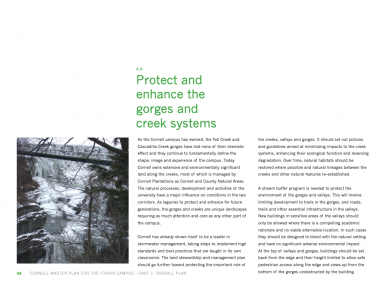
Beebe Lake at Cornell University
Beebe Lake is one of many water resources to protect and maintain. Cornell has a holistic approach to water and land management.
Water conservation and clean drinking water are our priorities
Clean, healthy water and water conservation are priorities for our campus. Water conservation, effective stormwater management, and protection of the regional watershed are all integral in maintaining finite global water supplies, improving the health of ecosystems, and maintaining a sustainable future for our campus and region.
Tap water on campus is clean, healthy, and monitored regularly. Our water quality is maintained by an expert team of staff and is safe to drink.
Here are some of the featured resources on this page:
Cornell Water Filtration Plant | Water in the Master Plan | Stormwater Management Program | Water Resources
Water Filtration Plant
Cornell University maintains a potable water filtration plant on campus, allowing our community to access healthy, clean drinking water daily. Constructed in 1927, the Cornell Water Filtration Plant provides the Ithaca campus and local communities of Forest Home and Cornell Heights with safe and reliable drinking water.
In 2024, the plant produced 346 million gallons, an average of 0.95 million gallons per day. Drawing water from Fall Creek, originating in Cayuga County at Lake Como, the plant can safely provide up to 3.6 million gallons of water per day. Cornell also has emergency agreements with the City of Ithaca Water Treatment Plant and the Bolton Point Municipal Water System for backup water supplies through permanent connections. Cornell's Annual Water Quality Report includes detailed information about Cornell water — from source to tap.

Cornell's Master Plan
The Campus Master Plan includes numerous water conservation goals and strategies, including protecting our gorges and creek systems, and valuing outdoor waterways as vital to our living laboratory and educational experience.
Water in the Master Plan
Cornell’s Master Plan states as it's vision: "The campus master plan is based on a long-term vision of what the Ithaca campus can become – how it might look and feel in 30-60 years and how it can promote sustainability.
Numerous areas of the plan highlight sustainable land and water management. For instance, the plan states that there will be no net loss of ecosystem services, such as carbon sequestration, storm water retention, filtration (bioremediation), groundwater recharge, water quality, erosion control, shade and climate control, biodiversity of plants and animals, soil health, etc. These services are provided by the natural system at a fraction of the cost it would take to design, install, and maintain mechanized systems to provide the same services for the campus. Conservation and stewardship are our highest priorities.
Stormwater Management Program

Development with water in mind
Cornell's Planning Department and others work to ensure water and stormwater management are integrated during every phase of a construction project
Only 3% of the Earth’s water can be used as drinking water. Cornell’s Stormwater Management Program protects our University’s water resources, allowing our University to minimize impacts to the Cayuga Lake Watershed while complying with federal, state, and local stormwater regulations.
Our stormwater management team works to reduce the effects of erosion and sedimentation from University activities and address other issues, including how stormwater runoff is impacted by construction activities on our campus. Our team works to ensure that the proper inspections and procedures are in place to reduce this pollution to the greatest extent possible by getting involved in projects during early planning phases to ensure compliance goals, provide stormwater orientation and training to contractors prior to construction activities, periodic inspections, and continuous interactions with project managers, construction managers and contractors.
Resources
Hundreds of programs and researchers at Cornell and in our community are focused on water conservation, stormwater, water quality, and more.
Water Research & Management
Cayuga Lake Modeling Project
Using an Ecosystem-Based Management (EBM) approach, Cornell and the New York State Department of Environmental Conservation (NYSDEC) have worked together to determine how much phosphorous can be added to Cayuga Lake while still protecting water quality and aquatic habitat.
Fall Creek Watershed Committee
Collecting water samples from Fall and Virgil creeks and their tributaries in order to measure water quality.
Cornell’s Drinking Water
Operating since the 1920s, Cornell’s potable water system serves about 35,000 people on campus and the surrounding community with clean, safe drinking water.
